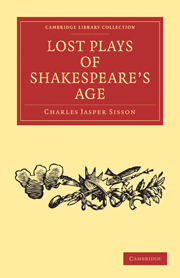Chapter IV - THE MAY GAME
Published online by Cambridge University Press: 05 July 2011
Summary
The May Game
The May Game does not lend itself readily to historical treatment. As far back as it can be traced it has already become intertwined and confused with other forms of ancient popular festivity, such as the Morris Dance. The Queen of the May herself is of a very respectable antiquity, as an institution, so antique indeed that, in the absence of facts, a vacuum which human nature abhors, theories have supplied an imaginative history of May Games and the like which is of the kind favoured by anthropologists. The May Game is held to be a form of rite arising out of the Fertility Cult. Its personages are vegetation deities or priests. The Maypole is a sacred tree, and the Game a kind of sacrifice. This kind of explanation takes also within its ambit the Morris Dance, the Sword Dance, St George and the Dragon, and Robin Hood and his merry men. In the meantime we have little documentary knowledge such as would enable us to reconstruct the actual development through the centuries of this form of merrymaking, still less enough to trace it back to the prehistoric solemnities from which it is held to have degenerated into mirth. The play-instinct, after all, may well have actuated the earliest of men even before he developed the most primitive of religious myths, much less the highly elaborate concepts and rites of the Fertility Cult.
- Type
- Chapter
- Information
- Lost Plays of Shakespeare's Age , pp. 157 - 185Publisher: Cambridge University PressPrint publication year: 2009First published in: 1936



